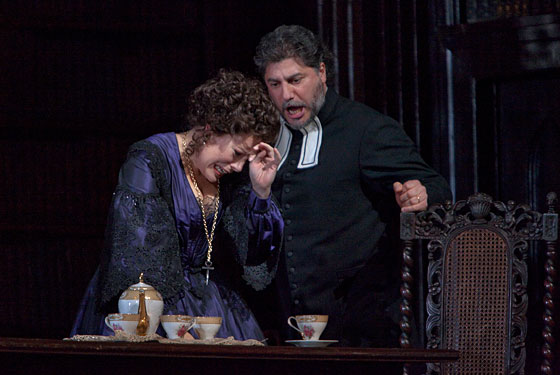
T he Metropolitan Opera’s undeclared mini-festival of Verdi’s two-star dramas—Stiffelio and Simon Boccanegra have opened, with Attila still to come—has turned into another Plácido Domingo orgy of multitasking. The tenor has been preparing for his 69th birthday on Thursday by singing, conducting, hosting the halftime show in the Met’s movie-theater broadcast of Rosenkavalier, and vigorously neglecting the two troubled companies he nominally runs, the Washington and Los Angeles Operas. On Monday, Domingo milked the poignancy of his role as the fading sovereign in Simon Boccanegra, which is about getting, holding, and yielding power. But he was practically winking at the audience in the final death scene, dropping to the stage and singing with a vibrancy that said, “don’t count me out quite yet.”
Domingo didn’t just star in Simon Boccanegra; the whole reason to revive it was the supertenor’s desire to try out a new career as a baritone. His voice, which was never light enough to make him sound like a classic tenor, also doesn’t have the mahogany heft of a genuine Verdi baritone—but who’s to cavil when it still contains such luxuriant energy, and when he can still make the music snap into focus merely by opening his throat? In the prologue, a young Simon, bewigged in chestnut ringlets, faces off against the older potentate Fiesco, sung by the 62-year-old James Morris. For a while there, it sounded like a creaky duel between two superannuated warriors: a tenor who could no longer reach the high notes and a bass-baritone who croaked out the low ones. But as they both warmed up, and as the ear adjusted to those weathered timbres, their scenes eventually became a respite from the sounds of stolid youth. Adrienne Pieczonka sang Simon’s long-lost daughter and Marcello Giordani her lamebrained swain with rote passion, as if they actually would rather be performing La Traviata. The magnificent chorus and James Levine’s orchestra both breathed fire but no life into a performance that slumped whenever Domingo fell silent.
If he didn’t quite save Boccanegra, neither did he sink Stiffelio with conducting that has progressed over the years from vague to basically okay. It’s an opera that has had a long and winding history, having been censored, bowdlerized, lost, and eventually reassembled for its first complete performances in 1993, featuring…Plácido Domingo. Giancarlo Del Monaco’s elegantly lugubrious production is back, and this time the role of the cuckolded reverend went to José Cura, one of several pretenders to the tenorissimo’s crown, who covered himself with respectability, if not quite with glory. Sondra Radvanovsky sang the role of Stiffelio’s wife Lina with irresistible rawness, alchemizing vocal iffiness into fierce intensity.
Opera isn’t just about singing celebrities. For all its faults, the cast of Stiffelio delivered an evening of compelling opera and made a powerful case for folding the work into the standard repertoire, while not even Domingo, with all his sovereign majesty, could whip Boccanegra out of its dutiful slog.
On to Attila next month.
